National University of Political Studies and Public Administration
Archives
-

Vol. 10 No. 1 (2026)
Volume 10, Issue 1 (2026) of the Smart Cities and Regional Development (SCRD) Journal explores how digital transformation, governance, and sustainability shape modern cities and regions. Published by the Faculty of Public Administration at SNSPA and the Smart-EDU Hub, this issue brings together international research from Europe, Africa, and beyond. The articles examine both global and local challenges. Topics include democratic global governance and cosmopolitan ethics, digital transformation in public hospitals, smart regional development, sustainable urban mobility, digital leadership in human resource management, and citizen engagement in smart cities.
Overall, this volume presents smart cities not simply as technology projects, but as complex governance ecosystems that require strategic leadership, institutional capacity, and social inclusion. It offers practical insights for researchers, policymakers, and practitioners working in public administration, urban planning, and digital transformation.
-
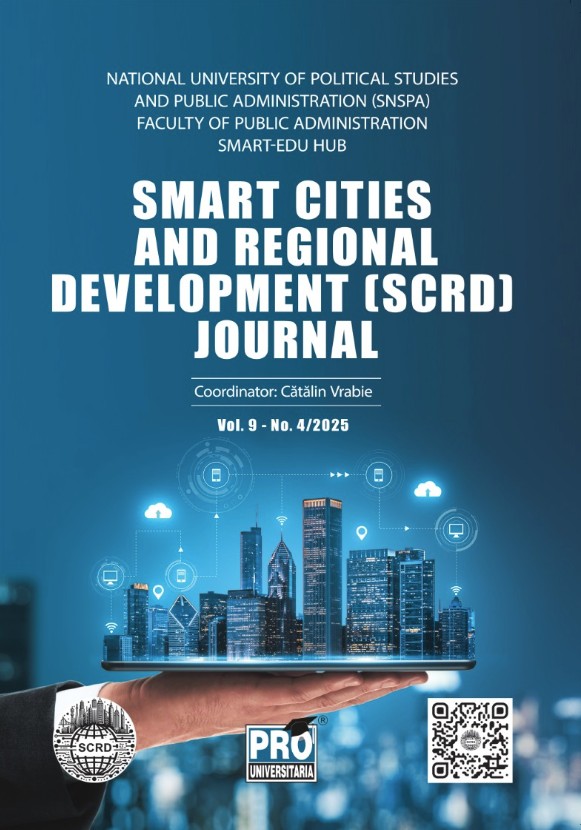
Vol. 9 No. 4 (2025)
This fourth issue of 2025 curates eight articles that cut across method, policy, and practice to show what “smart” really means when technology meets governance, design, and citizens. It opens with a rigorous, image-editing benchmark for re-imagining mid-20th-century “architecture of power,” comparing DiffEdit, ControlNet, and Kandinsky on accessibility and sustainability retrofits of landmark socialist-realist and modernist buildings across Warsaw, Riga, Cracow, and Bucharest - an empirical contribution that treats AI as a tool for inclusive architectural transformation rather than an aesthetic toy. It then shifts scale to the periphery: a Hungarian study distills how the smart-city canon adapts to disadvantaged rural communities, cautioning against ICT hype while foregrounding place-based capacity and community agency. Pedagogically, a new Object-Based STEM Learning framework is proposed to develop conceptual and interdisciplinary skills through non-linear, object-centred lessons teachers can operationalize in class.
Urban mobility is addressed through a data-driven ITS framework for Mashhad that integrates geo-databases, real-time exchange, and analytics, with simulated evidence of reduced congestion and emissions. Complementing these are a conceptual map of smart-city “pathways and pitfalls,” an econometric look at indoor electricity use and savings strategies in tropical Surabaya, a systematic review of the 2014–2024 literature on drivers of smart-city innovation, and a governance-oriented model for cultivating organizational culture that actually absorbs AI rather than merely adopting it. The issue closes with a horizontal audit of Romanian municipal websites, grounding digital-government ambitions in the everyday realities of interface quality, transparency, and service delivery. Together, these pieces argue for smart development that is evidence-based, human-centred, and institutionally mature.
-
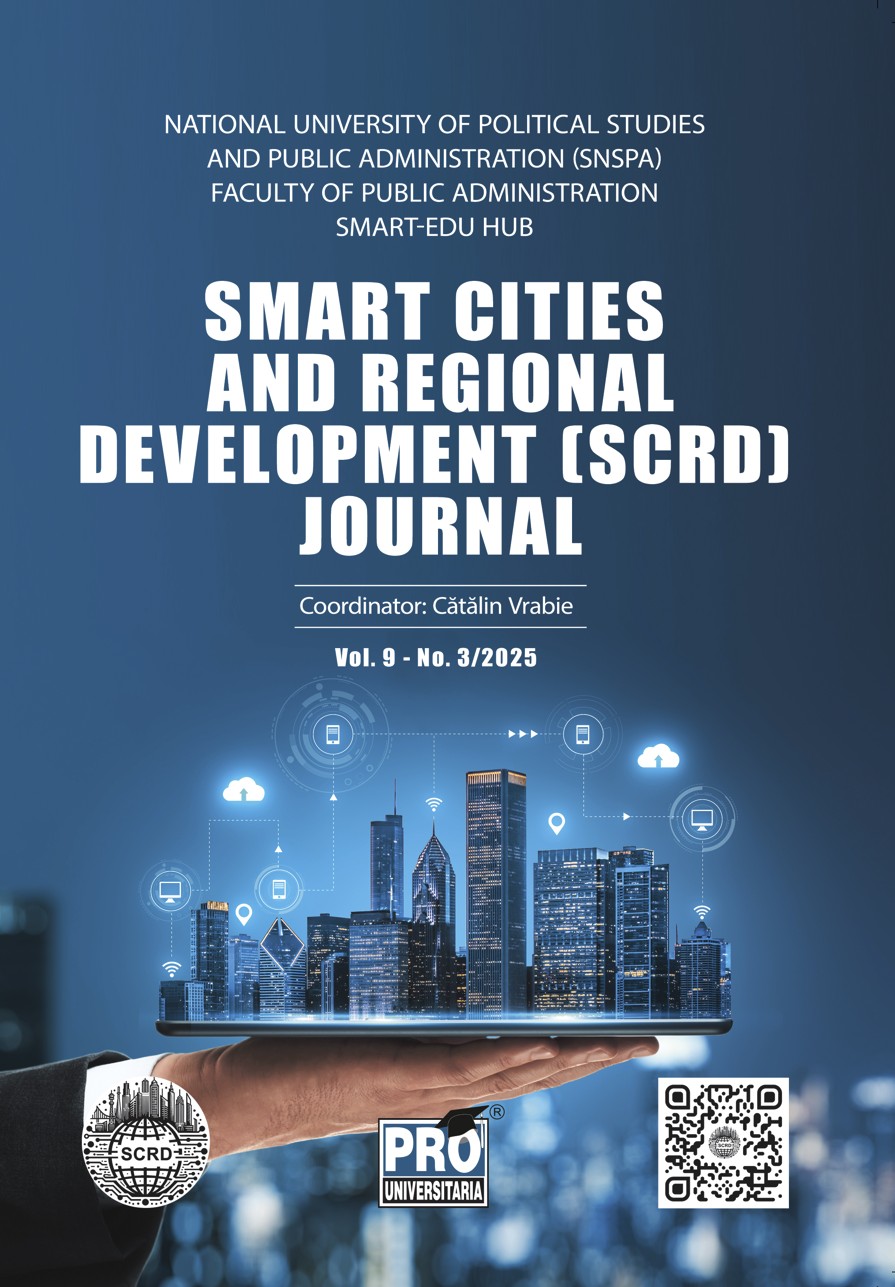
Vol. 9 No. 3 (2025)
The third 2025 issue gathers eight peer‑reviewed studies that explore how data‑driven policies and emerging technologies are reshaping cities and regions across four continents. Opening with a Moroccan case study on ICT‑enabled hospital logistics, the volume then examines ways to bridge the digital divide for Generation X and Boomers in the Western Balkans. Further contributions analyse fraud‑resilient smart‑payment architectures, the rural‑urban smart‑city gap in Moldova, and Yerevan’s roadmap for upgrading legacy infrastructure through public‑private digital partnerships. An ASEM university case illustrates how virtual‑learning ecosystems accelerate educational transformation, while a Łódź (Poland) case study details open‑data governance and a municipal digital twin. The closing article assesses how internationalisation and dual‑use innovation can future‑proof regional cluster organisations.
Together, these articles provide practitioners, scholars and policy‑makers with fresh evidence on energy‑efficient infrastructure, inclusive e‑services, AI‑supported governance and cross‑border collaboration, offering actionable insights for building greener, smarter and more resilient communities.
-
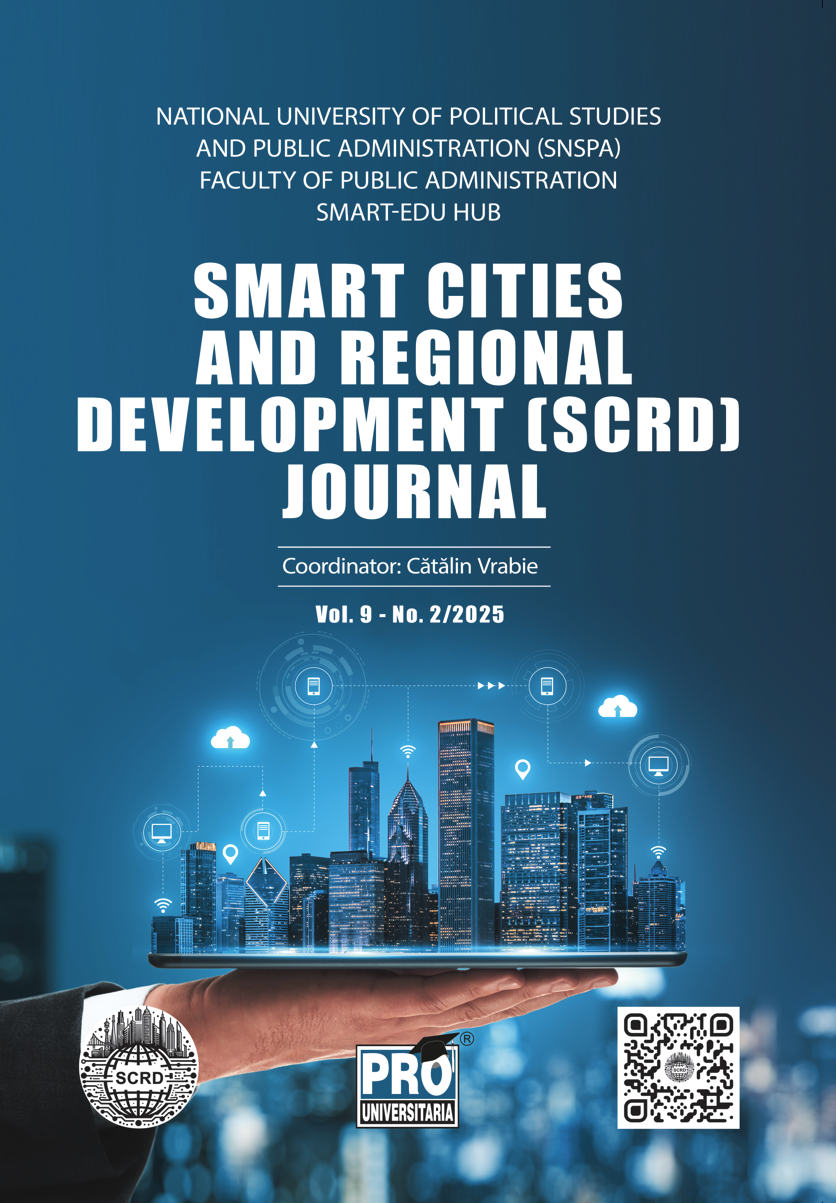
Vol. 9 No. 2 (2025)
The current issue of the Smart Cities and Regional Development Journal (Vol. 9, No. 2, 2025) brings together a series of interdisciplinary studies exploring the impact of emerging technologies on smart city development and sustainable regional growth. Key topics include the use of AI in digital out-of-home advertising, analyzed through the lens of campaign efficiency and personalization, as well as algorithmic collusion in the smart economy, highlighting associated legal challenges. Additionally, the issue presents studies on the social, economic, and environmental benefits of 15-minute cities, illustrating sustainable urban development models. Other contributions address participatory governance in smart cities, sustainability in relation to urban marketing, and the collective use of intelligence for security and surveillance purposes. Lastly, this edition includes an investigation into CO2 emissions accounting in the public sector and new IPSAS standards, emphasizing the challenges and opportunities for public administrations. Overall, this issue provides a comprehensive perspective on the interaction between technology, public policy, and sustainable urban development.
-
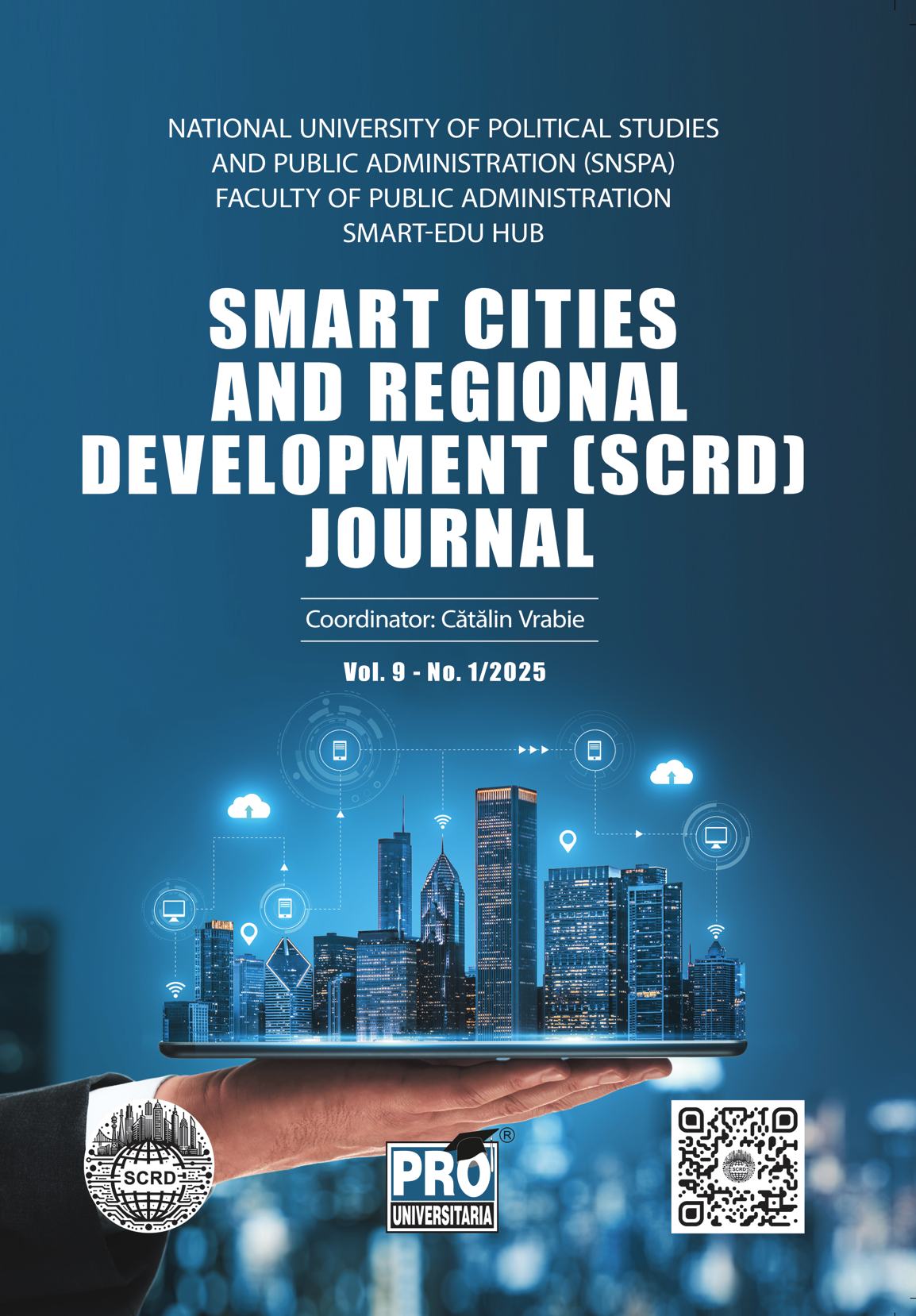
Vol. 9 No. 1 (2025)
The latest issue of the Smart Cities and Regional Development Journal (SCRD, Vol. 9, Issue 1, 2025) explores pivotal themes in the evolution of urban sustainability, digital transformation, and cybersecurity. This edition features diverse research, including the application of Business Continuity Management in public institutions, the transformation of urban consumption toward sustainability, and the progression of Smart City initiatives in Indonesia. Other topics include electronic waste recycling practices in Sub-Saharan Africa, the interplay between sociology and urban environments, and the integration of AI in ICT innovation. Together, these articles address critical challenges and innovative solutions shaping the future of urban and regional development globally.
-

Special Edition: Innovation, Sustainability and Technology
Vol. 8 No. 3 (2024)In this special issue, titled "Innovation, Sustainability and Technology " we delve into the forefront of technological advancements and sustainability practices shaping our world. Through a diverse collection of research articles, we explore quantitative and intelligent methods for predicting economic trends, such as birth rate time series, and offer comparative analyses on energy and water efficiency between China and the EU, highlighting the essence of smart living and sustainable development. This issue presents unique insights into the implementation of mathematical models in public health, with a focus on the Albanian case study, and investigates the factors influencing the content and success of Smart City initiatives, particularly through the lens of institutional organization theories. Additionally, we provide an in-depth comparison of leading Smart Cities, identifying best practices and areas for improvement. The issue also explores innovative strategies for accessing European cultural heritage in the Danube macro-region, emphasizing the role of digital transformation in preserving and promoting cultural identities. This compilation not only presents the latest research in smart technologies, public health, economic forecasts, and cultural heritage but also fosters a deeper understanding of the intricate relationship between technology, sustainability, and the socio-economic landscape, offering valuable insights for academics, practitioners, and policymakers dedicated to advancing public administration and development in the digital age.
-
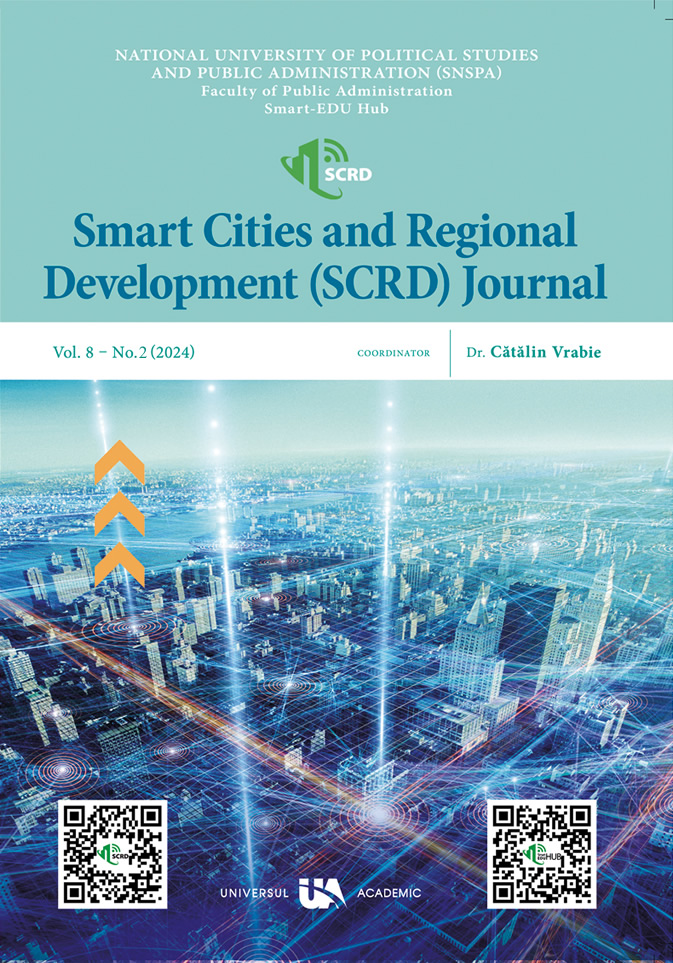
Vol. 8 No. 2 (2024)
The SCRD Journal, Volume 8 Issue 2, 2024, presents a compendium of insightful research articles that delve into various aspects of digital transformation, citizen engagement, innovative technologies, and sustainable practices within the realms of public administration, smart cities, and the cryptocurrency market. This issue features a diverse array of studies that not only examine the current state of digital literacy among politicians and civil servants in Romania but also explore the actual practices of citizen participation in smart cities, shedding light on the dynamic interaction between technology and urban governance. It also serves as a critical resource for academics, practitioners, and policymakers engaged in the fields of public administration, smart city development, digital literacy, sustainable practices, and technology-driven governance, offering a comprehensive overview of contemporary challenges and innovations.
-

Vol. 8 No. 1 (2024)
The SCRD Journal Volume 8 Issue 1 presents a comprehensive collection of insights on sustainable development and smart technology implementations around the world. It covers a range of topics including the improvement of waste management practices in gold mining for sustainable development, the exploration of smart mobility solutions in urban settings, and the journey of becoming a "Smart Nation," with a specific look at Singapore's initiatives. The journal also delves into the importance of environmental literacy for the conservation of urban wetlands, the potential and strategies behind the development of smart cities in Germany, the impact of digital and social media in empowering women in regional communities, the evolution of the sub-suppliers model in the context of Industry 4.0, and an assessment of the quality of life in smart cities across various European countries, highlighting the need for ongoing development. This volume collectively offers a nuanced understanding of the relationship between technology, sustainability, and community development in diverse global contexts.
-

Vol. 7 No. 2 (2023)
In the latest volume of the Smart Cities and Regional Development (SCRD) Journal (Vol.7 No.2, 2023), experts across multiple fields explore an array of topics related to smart cities and regional development. Rahmat, Vrabie, and Soesilo assess the effectiveness of the Indonesian government's cybercrime prevention campaign on Twitter, revealing interesting evidence regarding its impact. Radchenko investigates the economic and social implications of smart cities, providing invaluable insights from a multi-stakeholder pre-study. Babin, Colesnicova, and Tutunaru focus on the development of European villages in the Republic of Moldova, taking into account the Digital Economy Society Index (DESI). Zuhdy offers an innovative solution to water issues with the implementation of infiltration wells in 9 districts of Sidoarjo Regency, Indonesia. The Davidovics and Dejanovic propose a unique model for implementing vibration and sound heatmaps in smart cities using crowdsensing data. Boce critically examines the role of the human factor as an internal security threat within organizations, while Zisko and Hyra provide an insightful piece on security testing using Python scripts. Finally, Kumar presents a thoughtful analysis on the creation of smart citizenry, decoding the concept of a 'smart citizen'.
-

Vol. 7 No. 1 (2023)
The articles in this collection explore different aspects of smart cities, including attracting skilled workers, the application and challenges of web 3.0, ambient advertising in metaverse smart cities, and the use of RPA for data generation. Other topics include exchange rate forecasting with artificial intelligence, the conception and discourse of smart cities, and the utilization of green spaces as a cost-effective strategy for environmental and health risks control in residential plots. One particularly interesting article explores the algorithms weighing lives and freedoms in China's health code, providing a critical look at the intersection of technology and governance in smart cities.
-

Vol. 6 No. 3 (2022)
The articles in this collection focus on various aspects of smart cities and their development. "A look at the city of Fortaleza from the perspective of NBR ISO 37120:2017" examines the application of a standard for urban sustainability in a Brazilian city, while "Smart Cities and Digitalisation: A Research Agenda of Public Administration" proposes a research agenda to advance the study of smart cities. "Living in “Smart Cities and Green World”" looks at the relationship between smart cities and sustainable development, and "The perspectives of sustainable territorial development in smart cities" explores the concept of sustainable territorial development in the context of smart cities. "Digital Marketing and Outdoor Advertising in Smart Cities" discusses the role of digital marketing and outdoor advertising in the promotion of smart cities, while "Tourism Management System in Mongolia: the Case of Gorkhi-Terelj National Park" examines the application of smart city technologies in the tourism industry. Finally, "The new advanced Cities From the Green and Digital to the Smart Cities" explores the evolution of cities from green and digital to smart.
-

Vol. 6 No. 2 (2022)
The articles cover various topics related to smart cities and governance. The first article discusses the role of smart cities in promoting smart governance in municipalities. The second article talks about the elements of digital strategies of municipalities that contribute to wise governance. The third article focuses on the contribution of oil signs to the petroleum prospect in the Erindi region of Albania. The fourth article explores the theory and practice of establishing participative smart cities. The fifth article examines inter-organizational collaboration during emergency response, using the case study of 2016's Hurricane Matthew in Haiti. The sixth article presents an IoT system for healthcare in the smart city. The seventh article delves into urban marketing for smart cities. The final article discusses bundling and tying in smart living.
-

Vol. 6 No. 1 (2022)
The articles in this collection discuss various aspects of building and managing smart cities. One article explores the potential of informal collaboration between self-organized stakeholders to create a smart city, while another investigates the relationship between local culture and behavior intention to adopt e-government. Other articles offer smart solutions for urbanization in Albanian cities, strategies for transforming traditional workplaces into virtual workplaces, and evaluations of IT tools and strategies in business. One study examines the spatial planning regulations of Yogyakarta, while another presents a multi-case study of smart and connected cities in Pennsylvania. Overall, these articles provide insights into the challenges and opportunities associated with building and managing smart cities.
-

Vol. 5 No. 3 (2021)
The articles in this collection explore various aspects of smart cities and the technologies, policies, and social changes needed to create them. "Open data availability in Croatian local government: Improving the quality of life" by Robertina Zdjelar, Anamarija Musa, and Nikolina Žajdela Hrustek explores the role of open data in promoting transparency and improving the quality of life in Croatian cities. "Smart government in local adoption - Authorities in strategic change through AI" by Christian Schachtner investigates the use of artificial intelligence in local government to promote strategic change. "The future of work in the smart city: Managing virtual work by leveraging smart cities to achieve organizational strategy" by Joshua Olusegun Fayomi and Zainab Abdulqadir Sani examines the impact of smart cities on virtual work and organizational strategy.
-

Special Edition: The Impact of COVID-19 on Subnational Governance
Vol. 5 No. 2 (2021)Editors: Diana – Camelia Iancu, Veronica Junjan, Catalin Vrabie
The contributions united within this special issue illustrate the complexity of the governmental response needed not only to address the current situation, but, perhaps more important, to prepare the societal recovery and build for the future. From the Müller-Török and Prosser’s analysis of the effectiveness of the Corona app in Germany and questioning the value trade-off between privacy and transparency to the outlining of the direction of the urban redevelopment of slums in India, to the analysis of the impact of the lessons learned for building residential dwellings in Romania and the influence of the COVID19 response for the implementation of the Smart City strategy in Surabaya, Indonesia, the special issue underlines the need for trans- and inter-disciplinary research needed to support governmental response and build back better for the future.
-

Vol. 5 No. 1 (2021)
The articles in this collection explore different aspects of smart city development and governance across various regions of the world. The first two articles focus specifically on Bulgaria, examining both the country's regional policy and its prospects for developing smart cities. Other articles address topics such as the use of facial recognition technology in public spaces, the role of citizens in achieving smart city goals, and the challenges of managing information security in healthcare. These articles demonstrate the diverse range of issues involved in smart city development, including technological, social, economic, and political factors.
-

Vol. 4 No. 2 (2020)
The articles in this collection focus on various aspects of smart cities, including challenges in smartening cities, factors affecting citizen adoption of e-reporting applications, smart leadership, information security in healthcare, achieving global standards in public administration, assessing the potential for smart city development, architecture for active and healthy aging, and the impact of electronic payment methods on transparency and disclosure. These articles highlight the need for effective governance, leadership, and information security to realize the potential of smart cities, as well as the importance of citizen engagement and education in achieving this goal. They also emphasize the potential of smart cities to improve quality of life, promote sustainability, and drive economic growth.
-

Vol. 4 No. 1 (2020)
The articles in this collection cover a variety of topics related to governance, urbanism, and cybersecurity. "E-Learning challenges in Iran's higher education system and its implications in the realm of good governance" examines the challenges of e-learning in Iran's higher education system and how it affects good governance. "Understanding the trends and characteristics of smart urbanism across continents" compares the trends and characteristics of smart urbanism in different regions of the world. "Recommendations, best practices and key factors of smart city and smart citizenship" discusses the best practices and key factors of smart city and smart citizenship. "Hybrid nature of modern threats for cybersecurity and information security" looks at the modern threats for cybersecurity and information security. "History of trade between China and USA" examines the history of trade between the two countries. "Enhancing investment through cybersecurity policies - Case of Albania" analyzes how cyber security policies can enhance investment. "Measuring feminisation of urban poverty among domestic workers in Delhi, India" measures the feminization of urban poverty among domestic workers in Delhi. Finally, "A tale of two cities: Achieving smarter economy through communication and virtual work" explores how communication and virtual work can help achieve a smarter economy.
-

Vol. 3 No. 2 (2019)
The articles in this collection cover a diverse range of topics related to smart cities and international trade. Marcell László Tóth compares three smart cities from Middle-European countries, while Marica Dumitrascu examines the role of institutions in the liberal foreign trade policy of the Republic of Moldova. Takele Bekele Bayu measures governance performance in post-1991 Ethiopia, and Jiandong Shi presents a case study on the Sino-US photovoltaic dispute. Shiyi Tao explores the potential of smart tourism in reducing poverty, while Vilma Tomço, Edlira Gjolleshi, and Klorenta Pashaj analyze the use of e-signatures and e-services in Albania. Velibor Božić shares his experience with smart hospitals, and Valerii Logvinov and Svitlana Malonoga discuss the information infrastructure of emergency medical services in smart city solutions.
-

Vol. 3 No. 1 (2019)
The articles in this selection cover a range of topics related to the economic, technological, and societal aspects of cities and governments. Wei-Bin Zhang's article explores the interplay between education, saving, tourism, imported energy, foreign goods, and trade balance in small open economies. Hari Stankov Nikolov and Milena Yordanova Krumova use Hofstede's model to cluster EU countries based on similarities and differences in e-government and open government. Robertina Zdjelar and Robert Kelemen question whether citizens are as "smart" as the cities they live in, while Bissera Zankova examines the concept of a "smart society" in the context of "fake analytica." Mauro Romanelli discusses how cities are rethinking innovation through technology, and Branko Dimeski, Memet Memeti, and Mimoza Bogdanoska-Jovanovska explore international cooperation for accelerating smart city development in the City of Skopje. Michael Galukande-Kiganda and Loraine Boitumelo Tumi Mzini evaluate participatory governance models for enhancing the quality of local governments, and Ama Kissiwah Boateng discusses the role of green hotel development in building resilient cities in Ghana.
-

Vol. 2 No. 2 (2018)
The articles in this collection focus on various aspects of the development and implementation of smart cities. "Twenty years of transparency development in the public sector: What has been achieved?" takes a critical look at transparency in the public sector. "Smart citizens for Smart cities: the role of social media for expanding local democracy (The case of local referendums in Bulgaria)" examines the role of social media in expanding democracy and citizen participation in smart city initiatives. "Smart decentralization? The radical anti-establishment worldview of blockchain initiatives" explores the potential of blockchain technology to facilitate decentralization and anti-establishment initiatives. "Designing adaptable smart home environment based on resident's activity" presents a case study of a smart home environment that is adaptable to the residents' needs and activities. "Smart city initiatives: Street lights" discusses the use of street lights as a means of implementing smart city initiatives. "Digitalization and smartening public governance of the European high north regions" explores the role of digitalization in improving public governance in northern European regions. "Blue smart economy- A current approach towards growth" presents a vision for a "blue economy" that utilizes the resources and potential of marine environments. Finally, "Data-driven support for smart renewal of urban neighbourhoods" proposes a data-driven approach to the renewal of urban neighborhoods in order to make them smarter and more sustainable.
-

Vol. 2 No. 1 (2018)
The articles in this collection explore different aspects of smart cities. "Is the Smart cities of hybrid model of local government - The type III cities: Four possible answers" examines the role of local government in smart city development. "Smart governance and metropolitan dimension, Case for Krakow, Poland" discusses the importance of governance structures in smart cities, with a case study of Krakow. "People make a city smart" argues that people, rather than technology, should be at the center of smart city development. "Smart cities built by smart people: How to build Smart cities using a contextual participatory approach?" proposes a participatory approach to smart city development. "The Smart city vision: The internet-of-postal-things (iopt) approach" presents a vision of smart cities based on the internet-of-things, specifically with a focus on postal services. "Smart cities & crowdsourcing. A bottom-up approach" explores the potential for crowdsourcing to contribute to smart city development. "Smart city: A system for measuring noise pollution" presents a technological solution for measuring and addressing noise pollution in cities. Finally, "Beyond indicators, new methods in Smart city assessment" suggests new methods for assessing the effectiveness of smart city initiatives.
-

Vol. 1 No. 2 (2017)
The articles cover various topics related to smart cities. "What Does the 'Smart City' Construct Not Yet Contain?" explores gaps in the current concept of a smart city and suggests ways to address them. "Rediscovering the former city through digital archives" examines how digital archives can uncover historical information about a city. "Registration of motor vehicles and proposed improvements E-Government portal" proposes improvements to e-government portals for vehicle registration. "Using sentiment analysis with Big Data tools to enrich knowledge on society in the city" discusses the use of big data tools to gain insights into attitudes and opinions in a city. "Open Data Benchmarking for Higher Education: Management and Technology Perspectives" discusses the use of open data in higher education. "i-Locate. A comprehensive solution for indoor/outdoor localization" presents a comprehensive solution for indoor/outdoor localization. "Local Initiatives of Sustainable Development Stimulation. Case Study" discusses local initiatives for sustainable development. "Fostering the digital change in a smart city" examines the challenges and opportunities of digital transformation in a smart city context and proposes strategies for fostering this change.
-

Vol. 1 No. 1 (2017)
This issue of SCRD Journal includes articles on developing a business model for smart city initiatives, the impact of e-democracy on citizen engagement, modeling the performance of smart cities, the state of green spaces in Bucharest, brand placement on television soap operas in different cultural contexts, solutions to urban traffic issues, the role of science parks in regional economies in Russia, and the management of smart city projects using IoT. The journal provides a platform for researchers and practitioners to share their work and insights on the emerging field of smart cities.

